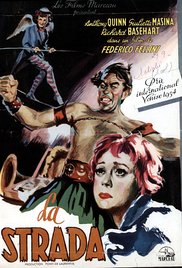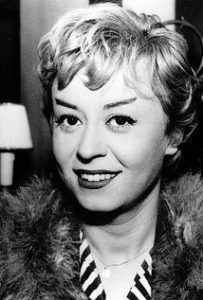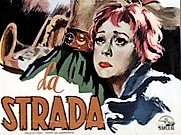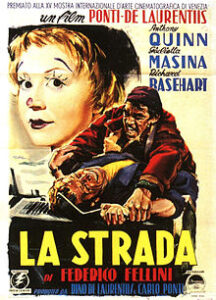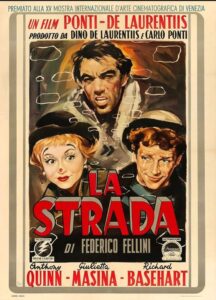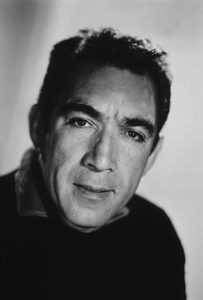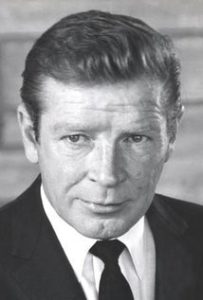La Strada [The Road] ***** (1954, Anthony Quinn, Giulietta Masina, Richard Basehart) – Classic Movie Review 4203
Italian maestro film-maker Federico Fellini’s movie La Strada [The Road] won the first official Best Foreign Language Film Oscar in 1957 (previous winners only got special award Oscars) for this beautiful 1954 character study of a brutal itinerant performer (Anthony Quinn) and the slow-witted carefree girl (Giulietta Masina) he befriends after buying her from her mother for 10,000 lire and some food. Masina and Quinn are unforgettable as the waif Gelsomina and the travelling showman Zampanò.
As they tour the countryside, Gelsomina falls desperately in love with Zampanò, but he repays her devotion with insults and beating, until they meet gentle acrobat tight-rope walker The Fool (Richard Basehart), who gets Gelsomina to question her choices.
Fellini’s masterpiece of poetic neo-realism is unforgettably acted by Quinn and Masina (La Signora Fellini). There are lots of wit and charm in the Oscar-nominated Best Original Screenplay (for Fellini and Tullio Pinelli), there are marvellous black and white visuals in Otello Martelli’s cinematography, and there is a wonderful Nino Rota score too.
Fellini also won the Silver Lion at the Venice Film Festival (but not the Golden Lion), in a bitter controversy leading to a public brawl between the film’s admirers and detractors, who felt he had strayed from neo-realism and had included ‘objectionable’ themes. Fellini called it ‘a complete catalogue of my entire mythological world, a dangerous representation of my identity that was undertaken with no precedent whatsoever’.
It is quite extraordinary that a film that is now regarded as one of cinema’s top films and most influential films would spark such a violent reaction at a Film Festival.
Also in the cast are Aldo Silvani as Signor Giraffa, the circus owner, Marcella Rovena as Widow, and Livia Venturini as Nun
It was a good Oscar year for Quinn, who also won best supporting actor for his Paul Gaugin in Lust for Life.
Producers Dino De Laurentiis and Carlo Ponti were the actual recipients of the first official Best Foreign Language Film Oscar.
There were many harsh problems during production: insecure financial backing, problematic casting, an on-set accident when the star dislocated her ankle, stopping filming for several weeks, and many delays. Fellini had a nervous breakdown and required medical treatment to complete principal photography. The film was shot in Bagnoregio, Viterbo, Lazio, and Ovindoli, L’Aquila, Abruzzo.
Producer Dino De Laurentiis wanted to cast his wife Silvana Mangano as Gelsomina, but Giulietta Masina was the inspiration for the film and Fellini was determined never to accept someone else. Production started in October 1953, but halted when Masina dislocated her ankle in the convent scene with Quinn. De Laurentiis saw his chance to replace Masina, but executives at Paramount viewed the rushes and praised her performance, resulting in De Laurentiis ordering her to sign a hastily prepared contract, at a third of Quinn’s salary.
As Quinn and Basehart did not speak Italian, they were dubbed in the original release. Unhappy with the actor’s voice dubbing Zampanò, Fellini remembered Arnoldo Foà dubbing Toshiro Mifune in the Italian version of Rashomon, and was able to hire him at the last moment.
Masina and Basehart re-appeared in Fellini’s follow-up Il Bidone (1955).
Previously, Quinn had been working on a film with Masina, who introduced him Fellini, who became convinced he was the perfect Zampan and asked him to take the role. Quinn turned Fellini down as he had no idea who he was, but Fellini hounded him for days. Later, Quinn spent an evening with Ingrid Bergman and her husband Roberto Rossellini. They watched Fellini’s I Vitelloni (1953), and Quinn realised Fellini’s genius and took the role. After production stopped for several weeks when Masina was injured, Quinn was obliged to start filming Attila the Hun (1954), but worked on it in the evenings and on La Strada in the daytime.
A musical make-over of La Strada toured in UK early in 2017, arriving at The Other Place theatre, Victoria, London, during June and July 2017.
© Derek Winnert 2016 Classic Movie Review 4203
Check out more reviews on http://derekwinnert

